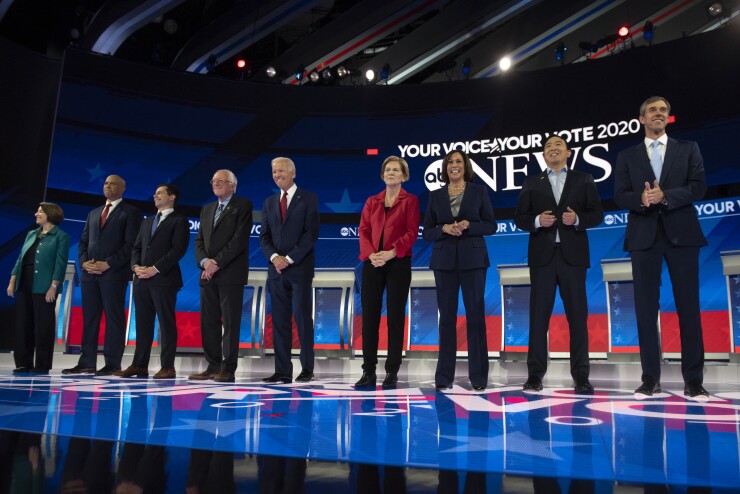WASHINGTON — The first three Democratic presidential debates elevated health care, climate change, immigration and gun control as top-tier in the 2020 contest.
But as candidates become more comfortable with their talking point on those issues, the time could be ripe to focus more on a topic where they may be uncomfortable: financial policy.
The Trump administration's record on the economy is inextricably linked with deregulatory policies. But the Democratic candidates have not been questioned at all by debate moderators on their views regarding economic policy, let alone financial regulation.
The good news is that at least one of the moderators slated to question the candidates on Oct. 15 is well equipped to press the candidates on financial services issues. CNN’s Erin Burnett started her career as an analyst at Goldman Sachs before working at financial news networks like Bloomberg Television and CNBC during the height of the financial crisis.

Here are three reasons the moderators should ask about financial policy at the Oct. 15 debate in Ohio.
Democrats are divided on the need for regulatory relief
Roughly a third of the Democrats in the Senate joined every Republican to support a bill, known as S 2155, to ease some of the post-crisis regulatory reforms on community and regional banks.
The law divided Democrats between those who saw it as a giveaway to the financial services industry, and those who touted it as an "economic growth" measure that kept the core pieces of Dodd-Frank intact.
None of the Democrats qualifying for the debate who were in Congress at the time supported the regulatory relief bill. Notably, Sen. Elizabeth Warren, D-Mass., publicly criticized the Democrats who did. Sen. Bernie Sanders, I-Vt., also strongly opposed the measure and has continually called for big banks to be broken up.
Yet two presidential candidates who did not qualify, Sen. Michael Bennet, D-Colo., and former Rep. John Delaney, D-Md., both cast "yea" votes. And not all of the candidates qualifying for the debate stage had an opportunity to vote on the bill. This includes former Vice President Joe Biden.
A question about S 2155 would highlight key differences among the Democratic field about the appropriate severity of financial regulation more than a decade after the crisis.
The Fed is under fire from President Trump
The Federal Reserve, arguably the most powerful banking regulator in the country, has been revered as an entity independent from political pressure. In fact, it was tradition for presidents to renominate a Fed chair to a second term, regardless of the political party of the previous president.
Until President Trump.
Trump nominated Jerome Powell to succeed the former Obama-appointed Fed chair, Janet Yellen, after she served one term. But now, Powell is facing Trump’s scorn. Trump has blasted the Fed’s interest rate decisions under Powell's leadership despite calls from previous board chairs for the agency to be free from political influence.
A debate question could focus on Powell's policies as Fed chair, which would likely produce a diverse set of answers. Not every candidate supported Powell's nomination. Warren, Sanders, Sen. Kamala Harris, D-Calif., and Sen. Cory Booker, D-N.J., all opposed Powell’s nomination. Sen. Amy Klobuchar, D-Minn., who will appear on the next debate stage, gave his nomination a thumbs-up.
More broadly, the debate moderators could try to shed light on the candidates' views about whether the Fed should be independent from political influence from the White House.
Democrats have already exhausted their talking points on other topics
The television networks have received pressure from some Democratic senators to devote debate time to climate change. Indeed, CNN already hosted a separate town hall event with several of the candidates entirely focused on climate issues.
It's time to make room for other topics. Cybersecurity in the wake of massive data breaches at Equifax and Capital One, as well as the future of the mortgage giants Fannie Mae and Freddie Mac, are two examples of pressing issues that should get some airtime.
Debate viewers have already heard the candidates' arguments about climate change, health care and gun control. But economic policy will likely be a key focus when the party's eventual nominee faces off with President Trump. And financial services issues should be at the center of any economic discussion.
Bankshot is American Banker’s column for real-time analysis of today's news.





